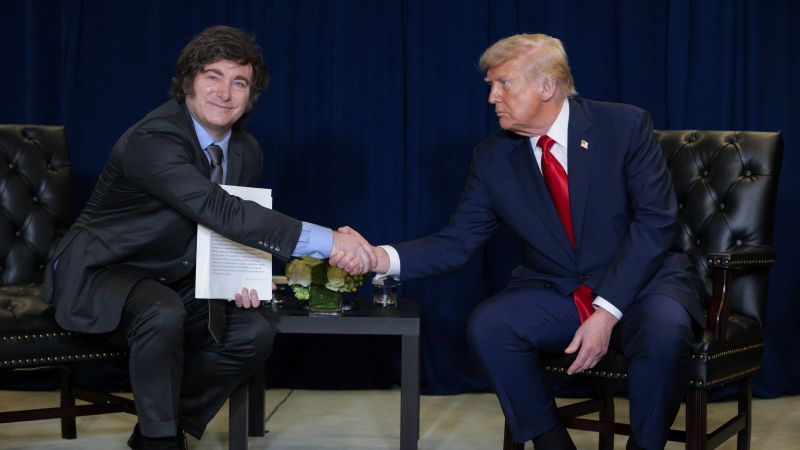A version of this story appeared in CNN Business' Nightcap newsletter. To get it in your inbox, sign up for free here.
New York —
The Trump administration is negotiating a financial lifeline for Argentina, seeking to stabilize its currency and prevent broader economic fallout.
Such an extraordinary intervention might seem like an odd choice for the Trump administration, whose “America First” agenda calls for a more hands-off approach to foreign affairs. But it starts to make some sense (ideologically, at least) when you view the effort through a global MAGA lens: It's one wealthy, far-right leader helping out his like-minded, loyal pal.
Here's the deal: Treasury Secretary Scott Bessent said Wednesday that the US would extend a $20 billion swap line — exchanging US dollars for pesos to help stabilize Argentina's financial markets — and potentially scoop up Argentine government debt.
Why? There's an economy answer and a geopolitics answer — which are obviously related, but let's start with the econ basics.
Investors began selling off Argentine assets after they watched President Javier Milei's party get absolutely trounced in a local election earlier this month. That vote suggested a lot of people aren't happy with Milei's free-market overhauls and suggested he could lose more political support in a bigger congressional election next month.
Because Argentina's economy has been hobbling from one crisis to another for decades, this kind of instability isn't uncommon.
Milei, who took office in 2023, is a hardline libertarian known for wielding a chainsaw during campaign events — a not-so-subtle symbol of his pledge to cut through regulations and slash government spending. (Our very own Elon Musk borrowed the gimmick from Milei, who gifted the billionaire a chainsaw at the Conservative Political Action Conference earlier this year.)
Milei's radical economic shock therapy has had some success — monthly inflation has fallen to around 2% from 25%, for instance (the annual rate is still among the world's highest, above 30%). But it has battered the economy elsewhere. Per the Wall Street Journal: “The economy is contracting. Tens of thousands of jobs lost during Milei's tough austerity drive have yet to come back. Clothing stores have shut their doors. Pensioners and teachers say they can't make ends meet. Financial markets are beset by growing turmoil.”
President Javier Milei at a rally in 2023. Tomas Cuesta/Getty Images
His administration is also engulfed in corruption scandals. Earlier this year, lawyers accused Milei himself of engaging in a crypto scam known as a rug pull. And more recently Milei's sister, a key player in his administration, was accused of taking kickbacks from pharmaceutical contracts. (The government has denied involvement in both alleged schemes, but that's done little to shore up investors' confidence in Milei's staying power.)
Last week, as financial panic escalated following Milei's party's poor showing in local elections, Argentina's central bank spent more than $1 billion of its foreign currency reserves to keep the peso from collapsing. The currency, along with Argentine stocks and bonds, began rebounding Monday after Bessent began talking about a financial life raft.
Now for the geopolitical context.
In a crisis, Milei has a powerful phone-a-friend in President Donald Trump, who praised the self-styled anarcho-capitalist and endorsed his reelection at the United Nations this week: “To the people of Argentina, we're backing him 100%,” Trump said.
Milei, similarly, has heaped praise on Trump, telling the UN on Wednesday that Trump saved the United States and the world from “catastrophe” with his migration and trade policies.
The US's sudden love for Argentina's economy “doesn't make any sense from a realist, strategic perspective,” Nate Schenkkan, an independent international relations expert, said in an interview. “This kind of stuff only really makes sense within an ideological framework.”
The administration is supporting Milei for the same reason they're supporting Victor Orbán of Hungary or Jair Bolsanaro of Brazil, Schenkkan says. “They want to see these people come into power. They think, ‘These are our people, let's use the tools we have to support them.'”
Bessent said as much Wednesday, when he described the swap lines and other financial aid as a “bridge to the election,” referring to the October midterms that Milei is hoping will secure him more support for his free-market reforms.
The $20 billion swap deal may buy Milei time. But it's not clear whether it'll be enough to quell voters' anger. And it leaves the US in an awkward position if Milei can't win back control of Congress.
Bessent and Milei appear to be going for the “confidence shock approach,” tweeted emerging markets trader Mark Dow. They want to believe that the turmoil is just political and things will stabilize if Milei can just do well in the next election.
“The biggest take away from all of this is the US is now on the hook,” Dow wrote. “If … the confidence shock doesn't work, the US kind of owns this and would have a hard time saying no to Argentina for a bigger bailout further down the road.”
